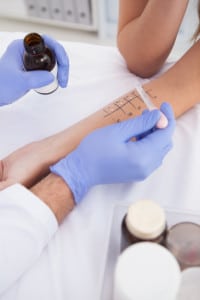Skin Allergy Testing
Over 50 million Americans suffer from nasal allergies. Another 15 million are affected by food allergies. Allergies account for over $18 billion in healthcare costs each year. Obviously, allergies are a major and common health issue.
But if you’re one of the many with allergies, what are your options? Are you limited to simply avoiding as many triggers as possible and taking constant over the counter medications? Fortunately, no. The allergy specialists at Accent Allergy offer cutting edge, but tested and reliable, techniques to definitively diagnose and treat your allergy issues, whether environmental or food based.
Allergy Symptoms and Diagnosis
What are allergies?
An allergic reaction is a response by your body to a foreign substance. That substance might be pet dander, tree pollen, peanuts, dust mites, shellfish or any number of other things. Basically, your immune system is reacting to the trigger with an overzealous response.
Normally, your immune system is great. It keeps you healthy and fights off harmful viruses and bacteria on a daily basis. However, sometimes it goes haywire. In some people, certain substances called allergens cause their immune response to be out of proportion to the threat. This results in allergy symptoms.
What are typical allergy symptoms?
Allergy symptoms vary widely from person to person, both in nature and severity. For some, exposure to ragweed pollen may cause a mild stuffy nose and some nasal drainage. For others, the symptoms are puffy eyes, a major headache, constant coughing and sneezing.
Most people react to bee stings with just the usual pain and maybe a small welt localized to the site of the sting. Others are subject to severe, life threatening facial and throat swelling.
The fact is that everyone has a different immune makeup and therefore different sensitivities to allergens. These symptoms can range from the annoying – sneezing, runny nose – to the dire – airway closure and anaphylaxis, which can easily cause death.
How do I know what I’m allergic to?
Although people may often have an idea of their possible allergy triggers from life events, the fact is that you can’t be certain which allergens you’re sensitive to without specific diagnostic tests. There are a number of tests available and the ones used vary based on what is appropriate to your unique situation and medical history. These include skin prick tests, intradermal skin tests and blood tests. These tests can confirm allergies as well as rule out substances to which you may not be truly allergic.
How do you get an allergy test?
Both skin prick and intradermal skin allergy tests are done at Accent Allergy. The process in both cases is very simple. For a prick test, a small device containing no needles is immersed into various antigens then placed on the skin on your back or on the inside of your forearm. These antigens can be from foods, insect stings, pollen and more – whatever you’re suspected to be allergic to. You are then monitored for a reaction at the site. The reaction usually occurs within 10-30 minutes. Multiple allergens can be placed during the same test and you’ll learn your results right away, during the same office visit.
Intradermal skin testing uses a small needle to inject allergens just below the surface of your skin. The needle does not penetrate into fat or muscle. Again, the nurse or doctor looks for a reaction in the next few minutes, and multiple allergens can be tested simultaneously.
In some cases, blood is drawn and sent to a laboratory for a radioallergosorbent (RAST) test. RAST testing looks for the presence of specific immunoglobin antibodies and the results take longer to be available.
Do skin allergy tests hurt?
Skin allergy tests are close to painless and hurt much less than an injection. If you have a positive reaction, your skin may be red and itchy in that area. Over the counter cortisone cream will usually clear this up. Your nurse or doctor will provide you with more information.
Is allergy testing safe?
Allergy testing is overall very safe. There is a slight chance that you will have a severe reaction to a certain allergen tested, however you will be in the office and under the care of medical professionals.
How should I prepare for my allergy test?
Your doctor will tell you more, but in general, you need to stop taking all antihistamine medications and certain heartburn medications before your allergy testing. These drugs can cause false negatives on allergy tests. Also, if you have certain chronic skin conditions, like eczema, you may not be a candidate for skin testing.
How much does it cost to get tested for allergies?
Prick tests and intradermal skin tests are affordable and are often covered in whole or in part by insurance.
Treatment and Management
Once your specific allergy triggers are determined through allergy testing, your treatment can begin. This will include counseling from an allergy doctor on the best course to take to minimize your allergy symptoms. Measures may include medication, avoidance and allergy immunotherapy.
Allergy immunotherapy is a series of injections that gradually desensitize you to an allergy trigger. They are often used when a reaction is particularly severe, or the allergy is to a substance that is difficult to avoid, like pollen or pet dander. Speak with your expert allergy physician to learn more and find out if allergy immunotherapy is a good choice for you.
Contact Allergy Specialists in Gainesville, FL!
If you have allergies, think you may have allergies, want to know more about allergies, or are interested in getting your allergies under control, contact us! Our allergy specialists will be happy to consult with you and get you on track to a healthier and happier life.
Accent Allergy & Sinus Center | 4340 W Newberry Rd #301 | Gainesville, FL 32607 | (352) 271-5389

